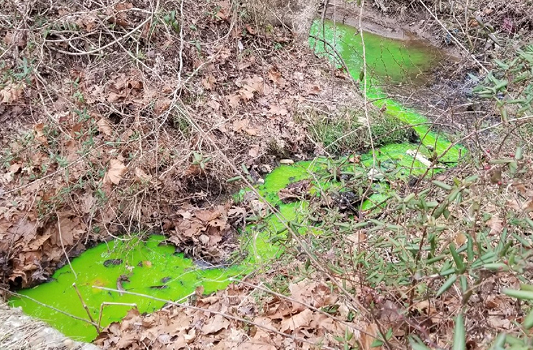In This Issue
- Maryland 2020 State Legislative Preview
- Maryland Local Roundup
- Virginia 2019 State House Election Victories
- Virginia 2020 General Assembly Legislative Preview
- Anacostia Park and Community Collaborative
- Download the PDF
Maryland Updates
2020 State Legislative Preview
This summer and fall, Clean Water Action’s Baltimore office has been busy preparing for the 2020 legislative session and focused on campaigns like forest conservation, pollinator protection, and sewage-free basements, and working with students to move our work forward!
Septic Systems
Maryland’s Chesapeake Bay Cleanup requires nutrient reductions from every sector that contributes to water pollution. Of the four major sectors contributing to Bay pollution, massive public investment has led to significant reductions in pollution from wastewater treatment plants; counties have permit requirements to reduce stormwater runoff; and agricultural pollution has seen significant reductions in recent years.
Unfortunately, pollution from septic systems is still unaddressed and continues to grow. Aside from the pollution issue, with changing rainfalls and our historic legacy of improperly placed systems, Marylanders around the state are experiencing failing septic systems — septic systems that are not adequately treating waste and putting public and environmental health in jeopardy. Maryland does not track failing septic systems, does not proactively inspect septic systems, and does not have sufficient resources available to help homeowners cope with expensive repairs that may be required.
Licensing Inspectors: Under current state policy, people who inspect septic systems are not licensed, leaving homeowners vulnerable to improper inspections that can miss costly problems with a septic system when they are purchasing a home. While the state does not require septic system inspections when a home is for sale, most banks require it for a mortgage. Clean Water Action is working on legislation to better regulate this industry to make sure that consumers are protected and that failing septic systems can be detected to protect public and environmental health.
Financing Repairs: When a failing septic system is found, homeowners are responsible for fixing it. Unfortunately, many homes have septic systems that would have never been approved under modern standards — the property may not have a backup dispersal field or may have the wrong soils, which can contribute to failure. To repair these systems a homeowner may be looking at a $30,000+ bill. Many homeowners cannot afford, or may not have the equity in their home, to take out low-interest lines of credit, and as a result put off these repairs. When repairs are put off, untreated waste continues to leach into surface waterways and groundwater. Clean Water Action is working to create financing for homeowners to repair or replace the dispersal systems for their units through low or no-interest loans.
Zero Waste
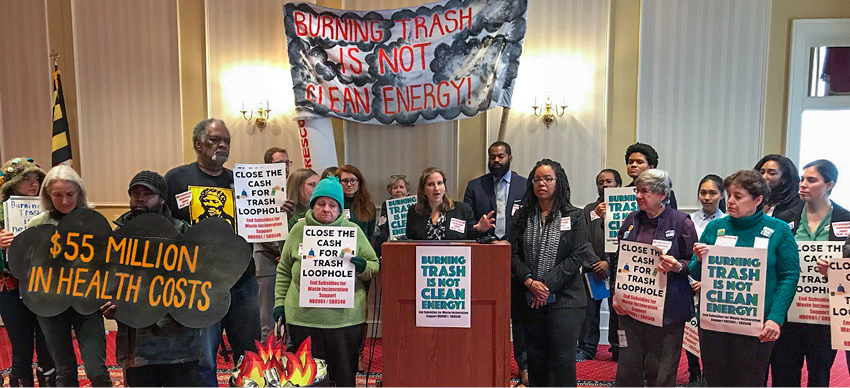
How communities across Maryland handle their solid waste has enormous impacts on local air quality, municipal budgets, and contributions to climate change. Both landfills and incinerators contribute greenhouse gases to the atmosphere, and incinerators emit toxins that contribute to cancer and more diseases in surrounding communities. But alternatives to landfilling and incineration, like composting and source reduction, can reduce costs, create more local jobs, reduce air pollution, and even sequester carbon. This year, we’re working on a set of bills to stop incentivizing trash incineration, and start promoting composting:
Maryland’s Renewable Portfolio Standard continues to define burning trash as clean energy and subsidize it like wind and solar, and the passage of the Clean Energy Jobs Act in 2019 made even more subsidies available to trash incineration. Trash incineration must be removed from Maryland’s Renewable Portfolio Standard to stop burning our money away, propping up a polluting industry, and allow truly renewable energy sources to grow in Maryland.
Maryland’s recycling definitions allow toxic incinerator ash to be counted as “recycled” when it’s used to cover landfills, providing an extra subsidy and incentive for trash incineration. Changing this definition will force trash incinerators to treat their toxic waste as what it is: toxic waste.
A coalition of zero waste and healthy soils groups are working together to pursue legislation that will divert large amounts of organic material from landfills to compost facilities. Growing a local compost industry is an important way to decrease the material going to incinerators and landfills, create a soil amendment that replenishes the soil biome and increases the carbon sequestration power of soils, and grow local jobs. For every dollar invested in compost, compared to landfilling and incineration, more local jobs are created.
Fair Farms
As part of the Fair Farms Campaign, we work with a coalition of local farmers, environmental groups, health groups, and businesses to elevate the message of our sustainable agricultural community in Maryland.
Chlorpyrifos: In 2020, Clean Water Action will once again work on a chlorpyrifos ban for Maryland. Chlorpyrifos is a highly toxic pesticide that poses dangers to humans, pollinators, and aquatic life. The pesticide has been banned for indoor residential use for decades because of its harmful effects on children and fetal development. In 2015, the U.S. EPA initiated the process to review its safety and ultimately recommended that all food uses of chlorpyrifos be banned. In 2017, the Trump Administration reversed course on chlorpyrifos for political, not scientific, reasons. While many states, including Maryland, are suing the EPA over this breach of process, Maryland can and should take action and ban chlorpyrifos for all uses here.
Local Roundup
During and outside of the state’s legislative session, Clean Water Action is involved on issues throughout the state.
Sewage Backups
More than 4,500 households in Baltimore each year report sewage backing up into their home — which could range from a small toilet overflow, to 2–3 feet of sewage flooding a basement. Aging city infrastructure, increased rainfall due to climate change, and even efforts to prevent sewage from overflowing into the Inner Harbor have led to more sewage flooding more basements in Baltimore — but even though the City is required by a federal Consent Decree to provide help to residents experiencing this problem, that help is hard to come by. In the first year of a special reimbursement program meant to help with the costs of cleaning up a sewage backup, only 10 households actually got reimbursed — even in part — for their costs. And although the city is meant to complete infrastructure upgrades to the sewage system to stop overflows into local streams by 2030, there is no deadline for stopping overflows into basements.
In September, Clean Water staff worked with the Maryland Department of the Environment to hold a public listening session and comment period about this reimbursement program — and as a result, an MDE employee told the Baltimore Sun that “state and federal officials are now discussing recommendations for immediate changes.” But we’re not stopping there: in November, the Baltimore City Council is holding a public hearing to get questions from the Department of Public Works about why so few people have received help and what the department could be doing to actually protect public health, provide direct assistance to residents who need it, and stop sewage backups from happening in the first place. Aging infrastructure across the state will create escalating public health threats as climate change continues, and making smart investments to prevent these impacts and protect public health when disasters do happen is a step that local governments across Maryland must begin to consider.
Saving Maryland’s Forests
Three Maryland counties are currently pursuing forest conservation updates: Anne Arundel, Howard, and Frederick counties. For many years, Clean Water Action has supported a state-level coalition working on updating Maryland’s Forest Conservation Act to better protect forests across the state. However, for years we have run up against entrenched developer opposition and confusion tactics, and the legislature has been unwilling to take action. Anne Arundel County’s legislation was introduced in September, Howard County’s in October, and we expect Frederick County to introduce legislation strengthening their Forest Resource Ordinance in November.
Clean Water Action partnered with a coalition in Southern Maryland to oppose two solar projects that proposed removing 500 acres of forest, the permits for which Maryland’s Department of the Environment denied at the end of August, citing irreparable harm to two high-quality waterways. While the organization supports solar projects and sees them as critically needed to combat climate change, we cannot sacrifice forest (and their critical ecosystem functions) to do so. Unfortunately, this forested parcel was targeted for clearcutting to “avoid controversies” that have arisen when solar is planned for active farmland. We hope that in the future, the solar industry will focus solar developments on brownfields, rooftops, and parking lots instead of chipping away at Maryland’s remaining forests.
Pesticides
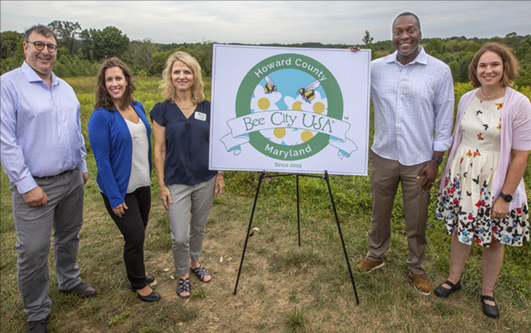
As steering committee members of the Smart on Pesticides Campaign, we have been engaged in local action on the pesticide issue. The Pollinator Protection Squad has checked over 40 stores in Maryland for neonicotinoids, a pesticide that is highly toxic to bees that was banned for residential use in 2016. With the Hogan administration continuing to not fund enforcement, the work performed by the Pollinator Protection Squad is critical to demand compliance with the Pollinator Protection Act.
Howard County has become a Bee City, and is in the process of passing legislation to ban all spraying of chlorpyrifos on county-owned, managed, and controlled properties. Neonicotinoids and glyphosate will also be banned, but a waiver process will be in place in case these pesticides are required to control certain invasive and noxious pests, like the emerald ash borer. These waivers will be available to the public and the county will use integrated pest management, to use the least toxic method first. While this ordinance does not apply to schools, Maryland schools have used integrated pest management since 1999!
Baltimore Bag Ban
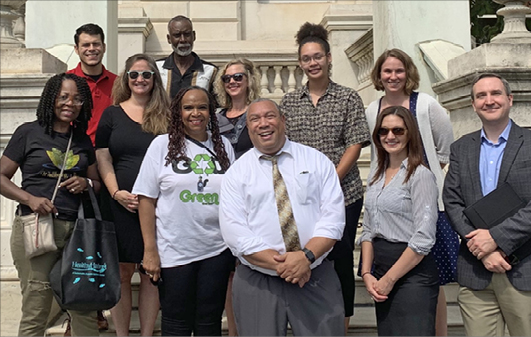
As of press time, Baltimore City was close to voting on a ban of plastic checkout bags in stores, with exceptions for bags used for certain products like fresh meats, unpackaged fruits, or ice, and certain locations like farmer’s markets and pharmacies. The bill puts a fee on other non-reusable bags, to cover the higher expense of stocking other kinds of bags and to raise funds for reusable bags and litter reduction. Of course, people bringing their own reusable bags to the store won’t have to pay anything — and that’s the change we want to see! Plastic bags are problematic — they litter streams and waterways, they clog storm drains, and they are a nightmare for recycling facilities.
Over the course of one public hearing and three work sessions, a number of amendments have been proposed or discussed that could make the bill weaker. An amendment was passed to make the bill only apply to the thinnest of bags, but allow slightly thicker plastic bags to remain in circulation; language exempting customers using SNAP, WIC, and similar programs from having to pay a fee for bags was struck out; and there’s been discussion of further limiting the kinds of stores this bill would apply to. Having a bill that meaningfully bans plastic bags in an equitable way is worth getting right.
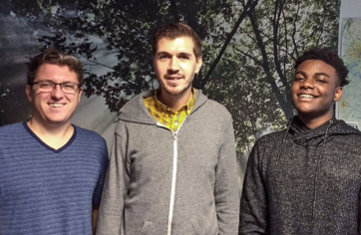
Fall Interns: Clean Water Action is happy to have three students working in our Baltimore office this fall! From left to right: Adam Gaynor is a Masters of Public Health student at the University of Maryland, completing his practicum with us and focusing on the health impacts of trash incinerators, landfills, composting facilities, and other waste management strategies. David Rekoski is a Masters of Business Administration student at the University of Baltimore, focusing on how Maryland can better support zero waste initiatives and how Baltimore can better support residents dealing with sewage backups. Solomon Brooks is a senior in the Environmental Technology Program at Western School of Technology and Environmental Science in Baltimore County, focusing on community organizing and research on our sewage infrastructure and septics campaigns. Check out our blog for more about their work!
Virginia Updates
2019 State House Election Victories
On Tuesday, November 5 voters across Northern Virginia chose representatives in the House of Delegates committed to common sense policy solutions for addressing climate change and sea level rise, protecting coastal communities and ecosystems from offshore oil and gas drilling, and restoring the Chesapeake Bay.
Dan Helmer, State House District 40
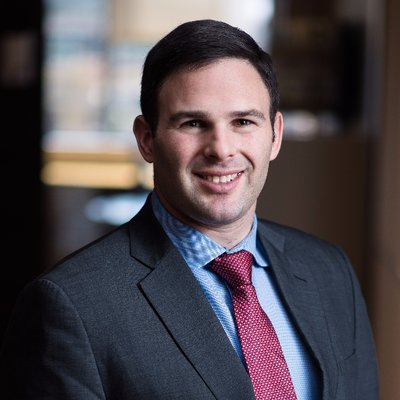
Through the support of voters like you, Clean Water candidate Dan Helmer won as the next Delegate of Virginia’s District 40 with 53.3% of the vote.
Dan will:
— Fight to protect Virginia’s coasts from drilling for oil and natural gas.
— Support and patron legislation that moves Virginia into the Regional Greenhouse Gas Initiative, guiding Virginia into the transition to renewable energy.
— Invest in public transit, and in turn reduce carbon emissions, by restoring Metro funding, expanding the Virginia Railway Express to Prince William County, and building more and higher quality bus stops around Fairfax.
Hala Ayala, State House District 51
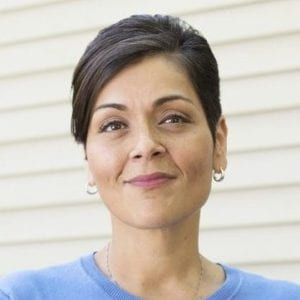
Clean Water candidate Hala Ayala re-won her seat as the Delegate of Virginia’s District 51 with 54.6% of the vote.
Hala will:
— Fight to hold electric monopolies accountable when they pollute the Commonwealth’s water.
— Introduce cleaner alternatives to burning fossil fuels to power the electricity grid in Virginia.
— Work to address inequities in how climate change affects communities with low income residents and people of color,
Wendy Gooditis, State House District 10
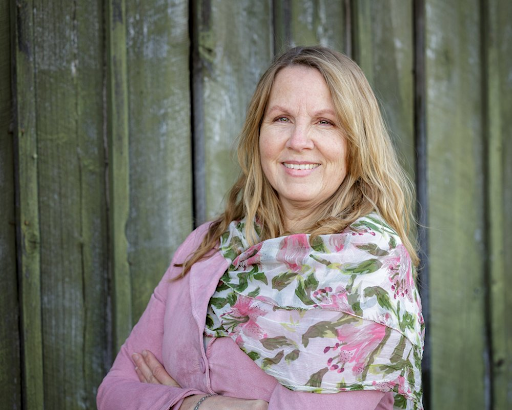
Clean Water candidate Wendy Gooditis re-won her seat as Delegate of Virginia’s District 10 with 52.4% of the vote.
Wendy will:
— Fight to reduce the amount of political clout that utility companies have in Virginia.
— Support ways in which Virginia can limit usage of single use plastics in an equitable way.
— Work to encourage more investment in renewable energies, such as solar.
2020 General Assembly Legislative Preview
Every year, Clean Water members and allies successfully help protect the Chesapeake Bay, open space, farmland, and historic sites during Virginia’s legislative sessions. Here’s a preview of what we Clean Water Action will be focused on:
Clean Water
Stormwater pollution from urban and suburban runoff into local streams is increasing and risks impacting the Commonwealth’s goal to restore Chesapeake Bay by 2025. The Stormwater Local Assistance Fund (SLAF) is a state and local matching grant program that helps address pollution from existing sites through implementation projects. Clean Water is working to ensure legislators provide consistent and adequate funding for conservation programs and allocating at least $80 million each year for SLAF.
The Atlantic Coast Pipeline and the Mountain Valley Pipeline are two interstate natural gas pipelines poised to have severe impacts on Virginia’s natural landscape and will put hundreds of crucial streams and drinking water supplies at risk. Clean Water is working with a coalition of advocates and allies across the Commonwealth to ensure state agencies conduct thorough, transparent and independent analyses that investigate the need for the pipelines and impacts on our water resources, natural landscape, and communities.
Clean Energy
The Regional Greenhouse Gas Initiative (RGGI) is a joint effort of nine northeast and mid-Atlantic states that sets a limit on carbon pollution and requires power plants over a certain size to purchase carbon allowances at quarterly auctions. The proceeds of these auctions are then distributed to RGGI member states, who can invest these dollars in energy efficiency programs, rebates for low-income residents, and incentives for renewable energy. The transition to renewable energy provides massive potential for economic development, green job creation, reduced health consequences and costs from burning fossil fuels, and lower utility bills. Clean Water will advocate for Virginia to formally join the RGGI and support legislation that requires utility investments in carbon-free renewable energy, with a 2050 deadline for 100% renewable energy.
Environmental Justice
Environmental justice means ensuring access to clean energy for all, access to safe drinking water for all, preventing disproportionate pollution, and more. While Virginia has started to make some progress on environmental justice, vulnerable populations, people of color, and low-income communities continue to be at an increased risk to the impacts of climate change, fossil fuel production, and the increase of toxics. Clean Water and our allies are working to support the implementation of an Environmental Justice Advisory Council in the Commonwealth, as well as legislation requiring an environmental justice analysis for new energy, industrial, and infrastructure projects.
Protecting Virginians from Toxic Chemicals
Lead exposure can lower a child’s IQ, affect the brain and nervous system development, slow growth, and cause hearing and speech problems. There currently is no treatment for low levels of lead in the blood. Though lead paint was banned from indoor use in 1977, paints for outdoor use may still include lead. Clean Water will advocate for a ban on outdoor lead paint, lead pipe disclosures for homebuyers and renters, an inventory of lead service lines made available to the public and a timeline for replacement of these lines, and more frequent testing for lead contamination in drinking water.
Perfluoroalkyl and Polyfluoroalkyl Substances (PFAS) are synthetic chemicals present in firefighting foam and found in many products, such as clothing, carpets, fabrics, furniture, food packaging, and cookware. PFAS are linked to kidney and testicular cancers, hormone disruption, thyroid disease, reproductive disorders, infertility, low birth weights, and even resistance to vaccines. They are found in fish, wildlife and humans; and because they don’t break down, PFAS accumulate in our bodies and the environment. Clean Water is working on a set of bills to restrict PFAS chemicals in firefighting foam and in food packaging and food service ware.
Sustainable Communities
Plastic Pollution in watersheds remains a substantial unresolved issue. Currently, municipalities are given inadequate tools to control this kind of litter. Clean Water will advocate for legislation that allows local communities and jurisdictions to establish fees or bans on commonly littered items such as single-use plastics.
Smart growth steers communities towards efficient, compact, walkable neighborhoods with high quality public transit. Fiscal conservatives and conservationists agree that traditional, car-dependent suburban sprawl is costly to taxpayers through inefficient public services and infrastructure spread over vast areas that results in lower air and water quality, and the loss of historic, cultural, and scenic resources. Clean Water is working with land-use and transportation policy experts to ensure Virginia adopts smart growth to save money, protect the environment, and enhance the economic competitiveness of Virginia’s communities and federal Opportunity Zones.
District of Columbia Updates
Anacostia Park and Community Collaborative

The Anacostia Park and Community Collaborative (APACC) (pronounced “A-pack”) is a Washington, D.C. network of more than 30 community-based organizations focused on ensuring the development of a Anacostia River corridor vision that supports the social, mental, physical, spiritual and economic health of Ward 7 and 8 residents. APACC brings together organizations to grow their capacity to meaningfully engage with community members living nearby Anacostia Park in Washington, DC, through workshops and events. Clean Water provides capacity to support APACC by serving as fiscal agent for the collaborative.
Formed in 2015, the network is supported by the Chesapeake Bay Funders Network’s Capacity Building Initiative — a three year, comprehensive program that provides support to watershed and community-based organizations to increase operational effectiveness. APACC is in its final year of the initiative to create a vision for a community-led, equitable redevelopment of the Anacostia River parks and adjacent neighborhoods.
Authentic Engagement Cohort
APACC was specifically formed to help maximize the value of public spaces along the Anacostia River to benefit residents of Ward 7 and 8 in the District of Columbia. It recognizes that many communities along the Anacostia River corridor have long been separated from the opportunities and benefits that a healthy river and vibrant park system could provide. With these communities in focus, APACC is committed to meaningful engagement with residents to achieve environmental justice and social equity, and are pursuing a number of strategies to increase engagement with the park and river.
In June of 2019, APACC launched a new initiative to build a cohort of organizations focused on meaningfully engaging Ward 7 and Ward 8 residents in Anacostia Park. Launched as a six-month program led by Akiima Price, the Community Liaison to Anacostia Park with National Capital Parks-East, the Anacostia Park Authentic Engagement Cohort works with the National Park Service on monthly events that help APACC build relationships with park visitors and prototype engagement activities to better connect with communities in Ward 7 and Ward 8. Hosted by the National Park Service, this program is supported by the Urban Waters Federal Partnership, Clean Water, and a team of APACC and community members.
Learn more:
To participate in this cohort, please contact Akiima Price: Akiima@apriceconsulting.com
Community-Driven Policy Agenda and Vision Development
APACC envisions a community-led, equitable redevelopment of the Anacostia River and adjacent neighborhoods in Ward 7 and 8, as well as a thorough cleanup of the Anacostia River. Through this process, APACC will foster the growth of a thriving, diverse, and sustainable community that takes ownership of the challenges and opportunities along the Anacostia River to improve the lives and livelihoods of both current and future residents. This collective vision is intended to be a “living” vision focused on the efforts that members of the Collaborative are actively working on, not just policies on an advocacy “wish list.”
APACC is committed to racial equity and ensuring that those most impacted by structural racism have full access and involvement in the planning and implementation of community projects, institutional policies, and environmental practices that impact their lives. Central to the work of APACC is shifting power to communities that have been structurally disempowered over time, and building the capacity of network members and the community so that together, members of the collaborative and Ward 7 and 8 communities can advance a shared community-driven policy agenda to build power, improve quality of life, dismantle structural racism, and increase meaningful economic opportunities.
As part of the development of a community-driven agenda for publication in 2020, the collaborative has focused on strengthening alliances between community organizations, schools, non-profits, businesses, and other stakeholders to identify shared community goals and accelerate partnerships that positively impact and enhance community and park health and ensure that future generations better connect, access, and enjoy Anacostia Park. APACC members D.C. Appleseed Center for Law & Justice and the Georgetown University’s McCourt Policy Innovation Lab are designing a framework outlining the shared policy priorities and recommendations of Anacostia River communities and members of the collaborative. Appleseed takes on some of the District’s toughest problems and works to implement solutions that improve the lives of low-income residents and people of color. The Policy Innovation Lab participates in strategic partnerships with organizations and community members in Ward 7 and 8 that engage students in policy research, analysis, formulation, and advocacy.
Network & Vision Principles
Over the Summer, APACC developed a Statement of Principles that embody the culture of the collaborative and serve as a set of operating agreements among network members. These principles will guide our collective vision and efforts to create a thriving, equitable Anacostia River Corridor. APACC developed the principles with the help of the Movement Net Lab — a Brooklyn-based “think-make-and-do-tank” comprised of movement-based activists, organizers, and researchers whose goal is to help facilitate the growth and effectiveness of dynamic, emerging social movements.
Read more:
